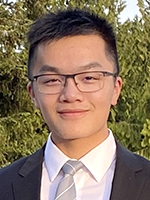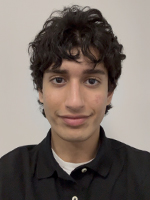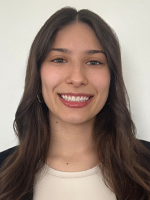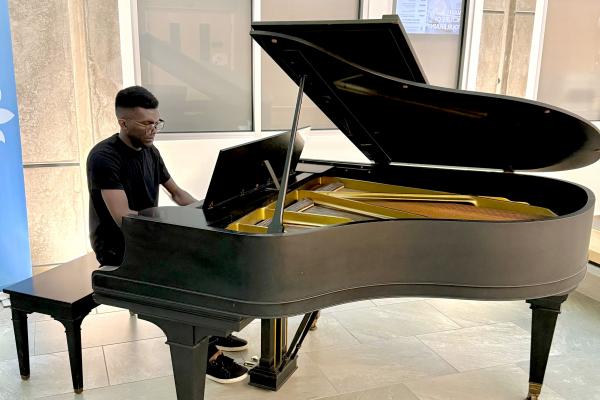
Congratulations to the recipients of the VCHRI Summer Program Advancing Research Knowledge and Skills!
Vancouver Coastal Health Research Institute (VCHRI) is committed to fostering a culture of mentorship and supporting the next generation of health researchers through the Summer Program Advancing Research Knowledge and Skills (SPARKS). This program offers a unique opportunity for a select group of highly qualified undergraduate and medical students to explore their interest in health research and gain hands-on experience by undertaking a summer project with a VCHRI principal investigator.
The 2025 VCHRI SPARKS recipients are:

Supervisor: Dr. James Johnson
Project: Subcellular proteomic profiling of human primary β cells and stem cell-derived insulin secreting beta-like cells (SC-β)
“Pancreatic islet cell transplantation can reduce the need for insulin in patients with type 1 diabetes, but the current supply of donor cells is insufficient to meet demand. Stem cell-derived beta cell therapies could offer an alternative method to help patients improve their glucose control, reducing diabetic complications and health care costs. Supporting Dr. Johnson’s team with this research brings us closer to making stem cell-derived beta cell therapy a viable clinical option.”

Supervisor: Dr. Zaid Mammo
Project: Longitudinal assessment of melanin content change in choroidal nevi with polarization diversity optical coherence tomography (PD-OCT)
“PD-OCT is a novel imaging technique that can detect melanin, a pigment molecule in the eye, which is found in choroidal nevi and melanoma. Introducing PD-OCT at the Vancouver General Hospital Eye Care Centre has the potential to enhance sensitivity in tumor monitoring and improve risk stratification. I am excited to deepen my knowledge of clinical ophthalmology research under Dr. Mammo and Dr. Ju's guidance.”

Supervisor: Dr. Lara Boyd
Project: Kinematic analysis of stroke recovery through AI-based movement tracking
“Stroke is the leading cause of adult disability, affecting nearly 90,000 individuals in Canada each year. In this research project, I will support the Brain Behaviour Lab in developing a machine learning model to improve movement analysis in stroke recovery. I hope to advance motor recovery assessments beyond traditional clinical settings, helping stroke survivors regain independence and mobility.”

Supervisor: Dr. Min Hyung Ryu
Project: The impact of climate change-related exposures on airway epithelial cells
“Wildfire smoke and aeroallergens — two exposures intensified by climate change — are known to exacerbate respiratory conditions. This project aims to investigate how these environmental triggers impact lung cells at a molecular level, with a focus on identifying key inflammatory pathways and potential therapeutic targets using advanced genomic tools. I am honoured to gain invaluable research experience under the mentorship of Dr. Ryu in this fascinating area of respiratory medicine.”

Supervisor: Dr. Sara Belga
Project: Risk factors for developing yeast or multi-drug resistant blood stream infection in patients with stem cell transplant and hematological malignancy: A case-control study
“This project tackles a critical challenge across Vancouver Coastal Health: the high burden of bloodstream infections caused by yeast and multi-drug resistant organisms. Under Dr. Belga’s guidance, I will apply statistical methods to identify key risk factors. Our findings could lead to the development of new diagnostics and therapies, especially against drug-resistant pathogens.”

Supervisor: Dr. Amy Jamieson
Project: Developing patient derived xenograft models to study HER2 intratumoral heterogeneity in p53abn endometrial cancers
“Endometrial cancer is the most common gynaecologic cancer in Canada. This study seeks to inform personalized treatment strategies for patients with the most lethal and aggressive subtype, p53abn, who currently have limited options. Under Dr. Amy Jamieson’s mentorship, I look forward to learning key molecular biology techniques and contributing to improved patient outcomes.”

Supervisors: Dr. Teresa Tsang and Dr. Shane Arishenkoff
Project: Lung ultrasound and atrial strain in heart failure
“Heart failure is a leading cause of death worldwide. One challenge in diagnosis is the accurate detection of lung fluid accumulation. Dr. Tsang’s study compares the diagnostic accuracy of chest X-ray, biomarker BNP and POCUS lung fluid assessment for detecting this condition. I am eager to support the interpretation of POCUS results to enhance patient care at VCH and beyond.”

Supervisor: Dr. Todd Woodward
Project: Enhancing pre-surgical precision in epilepsy through mapping the language network
“For patients with drug-resistant epilepsy, surgery may be the only option. However, it carries the risk of post-surgical language decline. Our research aims to reliably map individual language networks for personalized surgical planning. Working at the Woodward Lab is a meaningful start to my career in cognitive neuroscience, and I am excited to learn brain imaging and data analysis techniques.”

Supervisor: Dr. Naisan Garraway
Project: Personalized risk stratification and reduction of venous thromboembolism among trauma patients
“Vancouver General Hospital is the highest-volume Level I trauma centre in Western Canada and plays a critical role in traumatic injury care. Collaborating in this multicentre study, we aim to improve the management of venous thromboembolism — a major complication among trauma patients. It is a privilege to learn more about trauma care under Dr. Garraway while supporting clinical decision-making and improved patient outcomes.”

Supervisor: Dr. Orson Moritz
Project: CRISPR knockout of ZMPSTE24 and its effect on rhodopsin cleavage in retinitis pigmentosa
“Retinitis pigmentosa leads to progressive debilitating vision loss and currently has no approved treatment. Understand the molecular mechanism behind the disease is essential to developing accessible and equitable treatments. Working with Dr. Moritz’s team, I hope our findings will contribute to improved outcomes and a better patient experience.”

Supervisor: Dr. Kathryn Isaac
Project: Comparing the safety and effectiveness profiles of autologous and alloplastic breast reconstruction methods
“Immediate breast reconstruction can greatly improve the psychological and emotional well-being of patients undergoing mastectomy. Under Dr. Isaac’s guidance, I will support research aimed at enhancing clinical decision-making and tailoring breast reconstruction techniques. I am passionate about improving care for women — an often-underrepresented group in health care research.”
SPARKS is made possible with the generous support of the VGH & UBC Hospital Foundation in partnership with VCHRI.


